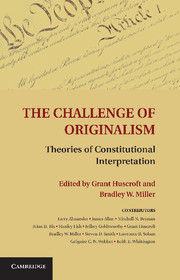Book contents
- Frontmatter
- Contents
- Preface
- Contributors
- The Challenge of Originalism: Theories of Constitutional Interpretation
- Part One Exposition and Defense
- Part Two Interpretation and Intention
- Part Three Originalism and Constitutional Settlement
- Part Four Challenges and Critiques
- 10 That Old-Time Originalism
- 11 Reflective Equilibrium and Constitutional Method: Lessons from John McCain and the Natural-Born Citizenship Clause
- 12 Constitutions, Originalism, and Meaning
- Index
- References
12 - Constitutions, Originalism, and Meaning
from Part Four - Challenges and Critiques
Published online by Cambridge University Press: 07 October 2011
- Frontmatter
- Contents
- Preface
- Contributors
- The Challenge of Originalism: Theories of Constitutional Interpretation
- Part One Exposition and Defense
- Part Two Interpretation and Intention
- Part Three Originalism and Constitutional Settlement
- Part Four Challenges and Critiques
- 10 That Old-Time Originalism
- 11 Reflective Equilibrium and Constitutional Method: Lessons from John McCain and the Natural-Born Citizenship Clause
- 12 Constitutions, Originalism, and Meaning
- Index
- References
Summary
Introduction
Originalism constitutes a group of approaches to interpreting the United States Constitution, or perhaps constitutions generally. For a long time, “originalism” meant a focus on the intentions of the Constitution's Framers. However, this approach was sharply criticized on a variety of grounds. More recently, the “new originalists” have offered an important repackaging of the originalist approach to constitutional interpretation. Part of what has made these newer versions of originalism more powerful than their predecessors has been their more modest claims and focus, which has included an emphasis on the meaning of constitutional terms, and the distinction between questions of the text's meaning on one hand and the derived legal rules on the other hand.
In this chapter, I will use Larry Solum's elaboration and defense of originalism – his “Semantic Originalism” is one of the most detailed, sophisticated, and well-defended versions of (“new”) originalism – as a useful starting place. I want to focus on two narrow, but important, aspects of new originalism. First, in Part I, I will focus on semantic meaning, an important element in Solum's version of originalism (and that of a number of other originalism theorists). For Solum, determining the semantic content of a constitution, or constitutional provision – as understood at the time of ratification – is the first step in determining what the text requires. In particular, I will suggest that semantic content needs to be understood differently in a normative, or legal normative context (compared to conventional, assertive propositions), in particular that the tie between meaning and application may be closer.
- Type
- Chapter
- Information
- The Challenge of OriginalismTheories of Constitutional Interpretation, pp. 285 - 300Publisher: Cambridge University PressPrint publication year: 2011

